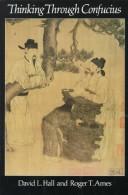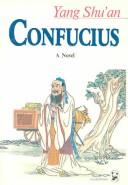| Listing 1 - 10 of 30 | << page >> |
Sort by
|

ISBN: 058507609X 9780585076096 0887063772 9780887063770 0887063764 9780887063763 Year: 1987 Publisher: Albany State University of New York Press
Abstract | Keywords | Export | Availability | Bookmark
 Loading...
Loading...Choose an application
- Reference Manager
- EndNote
- RefWorks (Direct export to RefWorks)
Thinking Through Confucius critically interprets the conceptual structure underlying Confucius' philosophical reflections. It also investigates "thinking," or "philosophy" from the perspective of Confucius. Perhaps the philosophical question of our time is "what is philosophy". The authors suggest that an examination of the Chinese philosophy may provide an alternative definition of philosophy that can be used to address some of the pressing issues of the Western cultural tradition. This book finds an appropriate language for the interpretation of traditional Chinese philosophical thought - a language which is relatively free from the bias and presuppositions of Western philosophy.
Philosophy --- Philosophy & Religion --- Confucius. --- Konfuzius --- Kung tzu --- Kong zi --- Kongzi --- Confucianism. --- Neo-Confucianism.
Book
ISBN: 1136577491 1315018977 9781136577499 9781315018973 0415361834 9780415361835 9781136577567 9781136577635 9781138878839 1136577564 Year: 2005 Publisher: Abingdon, Oxon
Abstract | Keywords | Export | Availability | Bookmark
 Loading...
Loading...Choose an application
- Reference Manager
- EndNote
- RefWorks (Direct export to RefWorks)
First published in 1931. This re-issues the edition of 1972.
This translation and Wilhelm's invaluable commentaries provide a concise and readable survey of Confucius, the man and his teachings. This volume translates The Life of Confucius from an ancient Chinese text, the Shih Chi, or The Historical Records by Sse-Ma Ch'ien, dating from the turn of the second century B.C.
Philosophy, Confucian. --- Confucianism. --- Religions --- Confucian philosophy --- Confucianism --- Philosophy, Chinese --- Confucius. --- Konfuzius --- Kung tzu --- Kong zi --- Kongzi
Book
ISBN: 1009029681 1009034464 1316516326 100903426X Year: 2021 Publisher: Cambridge : Cambridge University Press,
Abstract | Keywords | Export | Availability | Bookmark
 Loading...
Loading...Choose an application
- Reference Manager
- EndNote
- RefWorks (Direct export to RefWorks)
The Aura of Confucius is a ground-breaking study that reconstructs the remarkable history of Kongzhai, a shrine founded on the belief that Confucius' descendants buried the sage's robe and cap a millennium after his death and far from his home in Qufu, Shandong. Improbably located on the outskirts of modern Shanghai, Kongzhai featured architecture, visual images, and physical artifacts that created a 'Little Queli,' a surrogate for the temple, cemetery, and Kong descendants' mansion in Qufu. Centered on the Tomb of the Robe and Cap, with a Sage Hall noteworthy for displaying sculptural icons and not just inscribed tablets, Kongzhai attracted scholarly pilgrims who came to experience Confucius's beneficent aura. Although Kongzhai gained recognition from the Kangxi emperor, its fortunes declined with modernization, and it was finally destroyed during the Cultural Revolution. Unlike other sites, Kongzhai has not been rebuilt and its history is officially forgotten, despite the Confucian revival in contemporary China.

ISBN: 7507101363 0835131335 Year: 1993 Publisher: Beijing Chinese Literature Press
Abstract | Keywords | Export | Availability | Bookmark
 Loading...
Loading...Choose an application
- Reference Manager
- EndNote
- RefWorks (Direct export to RefWorks)
Book
ISBN: 3737006059 3847006053 3847106058 9783847106050 9863501646 9789863501640 Year: 2016 Publisher: V&R unipress GmbH
Abstract | Keywords | Export | Availability | Bookmark
 Loading...
Loading...Choose an application
- Reference Manager
- EndNote
- RefWorks (Direct export to RefWorks)
The essays collected in this volume establish Confucian role ethics as a term of art in the contemporary ethical discourse. The holistic philosophy presented here is grounded in the primacy of relationality and a narrative understanding of person, and is a challenge to a foundational liberal individualism that has defined persons as discrete, autonomous, rational, free, and often self-interested agents. Confucian role ethics begins from a relationally constituted conception of person, takes family roles and relations as the entry point for developing moral competence, invokes moral imagination and the growth in relations that it can inspire as the substance of human morality, and entails a human-centered, atheistic religiousness that stands in sharp contrast to the Abrahamic religions.
Confucianism. --- Confucian ethics. --- Religious ethics --- Religions --- Confucius. --- Konfuzius --- Kung tzu --- Kong zi --- Kongzi --- Philosophy --- Analects --- Confucianism --- Confucius --- Ethics --- Human --- Role ethics --- Philosophy, Chinese.
Book
ISSN: 07692633 ISBN: 9782204085823 2204085820 Year: 2009 Publisher: Paris: Cerf,
Abstract | Keywords | Export | Availability | Bookmark
 Loading...
Loading...Choose an application
- Reference Manager
- EndNote
- RefWorks (Direct export to RefWorks)
Grande figure de l'humanité, Confucius le fut assurément. Pourtant, il ne fut ni un prophète, ni le fondateur d'une religion, ni même une figure philosophique au sens où nous l'entendons en Occident. On a parlé de moraliste érudit, d'" honnête homme ". On l'a comparé à Socrate ou encore à Montaigne. En vérité, ce grand sage, doublé d'un savant, fut tout à la fois un éducateur au charisme exceptionnel, un idéologue profondément humaniste et un homme d'action qui chercha, durant toute sa vie, à réformer la société de son temps qu'il jugeait en perdition. Après des débuts incertains et grâce à l'engagement de ses disciples les plus doués, sa pensée, les idéaux politiques et moraux qu'il chérissait finirent par marquer d'une empreinte indélébile la société tout entière, s'ancrant dans les mentalités et influençant les us et coutumes du peuple chinois pendant plus de deux millénaires. S'appuyant sur des valeurs morales propres à transcender l'homme, l'enseignement de celui qui fut vénéré comme le Maître par excellence prôna une éthique universelle et intemporelle. A ce titre, le legs spirituel de Confucius reste d'une étonnante modernité. Dans cette étude approfondie, fruit de patientes recherches et de longues années de travail, l'auteur s'est employé à mettre en lumière les multiples facettes de sa pensée, s'attachant à en dégager les lignes de force, en se référant constamment aux sources anciennes sans négliger pour autant les travaux les plus récents.
Philosophers --- Confucius --- S12/0400 --- China: Philosophy and Classics--Kongzi 孔子 Confucius and Confucianism --- Confucius. --- Konfuzius --- Kung tzu --- Kong zi --- Kongzi --- Philosophers - China - Biography
Book
ISBN: 2711845982 9782711845989 Year: 2003 Publisher: Paris: Réunion des musées nationaux,
Abstract | Keywords | Export | Availability | Bookmark
 Loading...
Loading...Choose an application
- Reference Manager
- EndNote
- RefWorks (Direct export to RefWorks)
Art, Chinese. --- Art chinois --- Confucius --- China --- Chine --- Civilization --- Civilisation --- Art, Chinese --- Confucius. --- CDL --- 7.032 --- Chinese art --- Konfuzius --- Kung tzu --- Kong zi --- Kongzi --- Exhibitions --- Art --- China - Civilization - To 221 B.C.
Book
ISBN: 019287537X 9780192875372 Year: 1981 Publisher: Oxford: Oxford university press,
Abstract | Keywords | Export | Availability | Bookmark
 Loading...
Loading...Choose an application
- Reference Manager
- EndNote
- RefWorks (Direct export to RefWorks)
Confucius --- S12/0400 --- 299.512 --- #SML: Joseph Spae --- China: Philosophy and Classics--Kongzi 孔子 Confucius and Confucianism --- Confucianisme. Mencius. I Ching --- 299.512 Confucianisme. Mencius. I Ching --- Confucius. --- Konfuzius --- Kung tzu --- Kong zi --- Kongzi
Book
ISBN: 2760619575 9791036504389 2760624188 9782760619579 2760629600 Year: 2004 Publisher: Montréal: Presses de l'Université de Montréal,
Abstract | Keywords | Export | Availability | Bookmark
 Loading...
Loading...Choose an application
- Reference Manager
- EndNote
- RefWorks (Direct export to RefWorks)
On ne connaît aucun écrit de Confucius, ses aphorismes ayant été recueillis sous la forme d’« Entretiens » par ses disciples. Néanmoins, depuis deux millénaires et demi les enseignements du philosophe ont non seulement imprégné la civilisation chinoise et les cultures d’Extrême-Orient, mais ont aussi inspiré philosophes et penseurs en Occident. Cet ouvrage de Herbert Fingarette, dont l’impact à sa publication en 1972 a été immédiat et majeur dans le monde anglophone, était attendu de longue date par le public francophone. Il permet d’accéder à l’enseignement de Confucius de façon simple et directe, puisque les idées du célèbre philosophe y sont essentiellement abordées par le biais de ses paroles rapportées par ses disciples, les dépouillant de toute interprétation anachronique ou encombrante. Selon Fingarette, Confucius préserve le caractère sacré du rite, mais enraciné dans la sacralité de l’existence humaine elle-même, et en le dégageant de sa gangue religieuse. La présentation et les commentaires de Charles Le Blanc viennent enrichir le texte en situant Herbert Fingarette dans le contexte général des études confucéennes et orientales, soulignant ainsi son actualité et sa profonde originalité.
Confucianisme --- Confucianism --- Confucian rites and ceremonies --- Rituel. --- Rituals. --- Customs and practices --- Confucius. --- Confucius --- Konfuzius --- Kung tzu --- Kong zi --- Kongzi --- Morale. --- Ethics. --- Criticism and interpretation --- History. --- pensée chinoise --- rituel --- sacré --- confucianisme --- philosophie chinoise --- Prisoners --- HISTORY / General. --- Civil rights
Book
ISBN: 9020245406 Year: 1995 Publisher: Deventer Ankh-Hermes
Abstract | Keywords | Export | Availability | Bookmark
 Loading...
Loading...Choose an application
- Reference Manager
- EndNote
- RefWorks (Direct export to RefWorks)
Confucius. --- Si shu. --- Konfuzius --- Kung tzu --- Kong zi --- Kongzi --- Ssu shu --- Kyŏngsŏ --- Sasŏ --- Sze shoo --- Seu-chou --- Se chou --- Sse-chou --- Four Books --- Quatre livres --- 四書 --- Sishu --- Da xue --- Zhong yong
| Listing 1 - 10 of 30 | << page >> |
Sort by
|

 Search
Search Feedback
Feedback About UniCat
About UniCat  Help
Help News
News